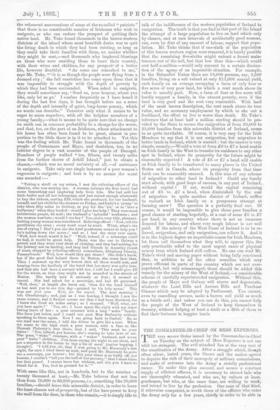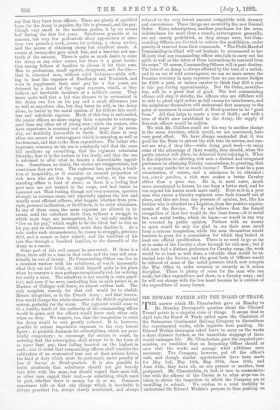THE COMMANDER-IN-CHIEF ON MESS EXPENSES.
THE very severe Order issued by the Commander-in-Chief on Tuesday on the subject of Mess Expenses is not one whit too stringent. The evil-attacked lies at the very root of the constitution of the Army. After a struggle which, thoagh often silent, lasted years, the Crown and the nation agreed to deprive the rich of their monopoly of military commissions, and make of entrance into the Army' a strictly professional career. To make this plan succeed, and secure a constant supply of efficient officers, it is necessary to attract lads who are thoroughly educated, and who are, by culture at least, gentlemen, but who, at the same time, are willing to work, and intend to live by the profession. One man of that kind, if otherwise competent, is worth three of the officers who enter the Army only for a few years, chiefly in order to be able to say that they have been officers. There are plenty of qualified boys, for the Army is popular, the life is pleasant, and the pay, though very small in the medium grades, is by no means bad during the first few years. Subalterns grumble at its amount, but very few professiois allow apprentices of nine- teen two pounds a week, rooms for nothing, a cheap service, and the means of obtaining cheap but excellent meals. A curate at twenty-five gets much less, and a barrister not one- tenth of the amount. There is quite as much desire to enter the Army as any other career, but there is a great hesita- tion among fathers of families to choose it for their sons. Men in professions, small squires, clergymen, and the like— that is, educated men, without solid fortunes—while will- ing to bear the expenses of Sandhurst and Woolwich, and even to supplement their sons' pay for a few years, are deterred by a dread of the vague expenses, which, as they believe, are inevitable incidents of a soldier's career. They know quite well that a lad who chooses to be economical in the Army can live on his pay and a small allowance just as well as anywhere else, but they fancy he will, in the Army alone, be forced by the social opinion of his fellows into need- less and indefinite expense. Much of this fear is unfounded, the junior officers no more urging their comrades to extravag- ance than any other set of young men ; while the seniors, who have experience in economy and a painful sense of its neces- sity, are decidedly favourable to thrift. Still, there is very often one source of extravagance which is annoying as well as burdensome, and that is the Mess expenditure. The father who impresses economy on his son is constantly told that the mess bill swallows up everything, that the regiment entertains liberally, that it is the custom to live freely, and that the son is ashamed to offer what he fancies a discreditable opposi- tion. Sometimes, no doubt, the stories are exaggerations, but sometimes they are true. The regiment has, perhaps, a tradi- tion of hospitality, or it contains an unusual proportion of rich men who are free in suggesting outlay, or the com- manding officer is fond of show ; or there is a feeling that poor men are not wanted in the corps, and had better be squeezed out. That feeling, though not very common, operates strongly in extreme cases, and especially against the few and usually most efficient officers, who happen, whether from prin- ciple, personal inclination, or thriftiness, to be strict abstainers. In any of these cases, the mess expenses are allowed to in- crease, until the subaltern finds that, without a struggle to which most boys are incompetent, he is not only unable to "live on his pay," which ought to be the ideal, but to live on his pay and an allowance which more than doubles it. As a rule, under such circumstances, he ceases to struggle, gets into debt, and is sooner or later ruined ; and the tradition of his ruin flies through a hundred families, to the discredit of the Army as a career. Some part of this evil cannot be prevented. If there is a Mess, there will be a tone in that mess, and the tone will occa- sionally be one of luxury. No Commanding Officer can live in a constant warfare with his subalterns, or watch incessantly what they eat and drink, or think himself quite in his place when he censures a man perhaps exceptionally rich for ordering too costly a wine. The subaltern is not exactly in data pupil- lari, and even if he were, controlling him on such points is, as Masters of Colleges well know, an almost endless task. The only complete remedy for that evil would be to abolish Messes altogether, as in the French Army ; and that innova- tion would change the whole character of the British regimental systeni, probably for the worse. The regiment would cease to be a family, much of the authority of the commanding officer would be gone, and the officers would know each other only when on duty. We suspect, too, that the temptation to enter the Army would be very greatly reduced. It is, however, possible to reduce imperative expenses to the very lowest figure ; to prohibit demands for subscriptions, which are prac- tically compulsory ; to encourage the seniors to resist, by ordering that the subscription shall always be in the form of so many days' pay, thus falling heaviest on the highest in rank ; and to insist that commanding officers shall consider the cultivation of an economical tone one of their serious duties, the kind of duty which must be performed, under penalty of loss of favour at Head-quarters. It is also possible to insist absolutely that subalterns should not get heavily into debt with the mess, but should regard their mess bill, as other men regard their rent,—as something which must be paid, whether there is money for it, or no. Common experience tells us that any charge which is inevitable is always provided for, always closely scrutinised, and always reduced to the very lowest amount compatible with decency and convenience. These things are secured by the new General Order. Extra subscriptions, needless purchases for the mess, indebtedness for more than a month, extravagance generally, are not merely prohibited, as they always were, but Com- manding Officers are directed to enforce the prohibition, under penalty of removal from their commands. "The Field-Marshal Commanding-in-Chief will not hesitate to recommend to her Majesty that any commanding officer who fails to carry out the spirit as well as the letter of these instructions be removed from his corps." Of course, Commanding Officers will in part disobey. The tone of an Army is always affected by the tone. of a nation, and in an era of wild extravagance, we can no more secure the Prussian economy in mess expenses than we can secure Judges for £400 a year, or induce curates to think that £50 a year is fair pay during apprenticeship. But the Order, neverthe- less, will do a great deal of good. The best commanding officers will obey it strictly, the officers who are diffident will be able to plead rigid orders as full excuse for interference, and the subalterns themselves will understand that economy to the point of meanness is considered at Head-quarters to be "good form." All that helps to create a tone of thrift ; and with a tone of thrift once established in the Army, the supply of first-rate officers would be endless.
We wish Mr. Childers could see his way to another change in the same direction, which would, we are convinced, have very great effect. We have always contended that it was good for the State to attract the rich into its service, and can- not see why, if they like—while doing good work—to enjoy some of the advantage of their wealth, they should, when the public interest will allow, be debarred from enjoying it. What is the objection to allowing rich men a distinct and recognised preference in obtaining Cavalry commissions, to granting, that is, so many marks for so much income ? There must be a pass examination, of course, and a minimum to be obtained ; but, ceteris paribus, a rich man makes a better Cavalry officer than a poor one. He is, in most cases, much more accustomed to horses, ho can keep a better stud, and he can expend his horses much more easily. Even as it is, a poor man who enters a Cavalry regiment soon finds himself out of place, and this not from any pressure of opinion, but, like his brother who is attached to a Legation, from the positive require- ments of the Service. We do not believe that the formal recognition of that fact would do the least harm—it is social lies, not social truths, which do harm—or would in any way be resented by public opinion. Fathers with no money to spare would be only too glad to see their sons saved from a ruinous temptation, while the sons themselves would hesitate to press for a commission for which they lacked at least one official qualification. There is no need to go so far as to make of the Cavalry a close borough for rich men ; but if rich men had a distinct preference for Cavalry corps, the work would be at least as well done, a valuable class would be at- tracted into the Service, and. the great body of Officers would be relieved of some of the social pressure which now compels the War Office to order economy as severely as it orders discipline. There is plenty of room for the man who can work, but likes expenditure and show, in a Cavalry corps ; and he will not charge with the leas heart because he is careless of the expenditure of many horses.



































 Previous page
Previous page